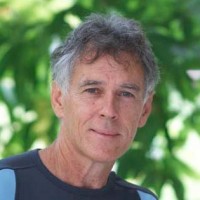Research Interests
- Ecology of Coral Reef Fish Populations and Communities
- Marine Conservation Biology and Environmental Impact Assessment
- Marine Animal Behaviour
Geoff Jones has worked extensively on the ecology of both tropical and temperate reefs in Australia, New Zealand, Oceania and Papua New Guinea. His research interests include the ecology, behaviour and life histories of reef fishes, and their interactions with reef communities. Recent work has focussed on the local and regional impacts of natural and human disturbances to coral reef habitats and associated fish populations. The role of larval connectivity in determining the spatial scales of human impact and recovery programs has been central to his research program. He obtained his PhD at the University of Auckland in 1980, and subsequently held a postdoctoral fellowship at the University of Melbourne, a Queen’s Fellowship in Marine Science at the University of Sydney and a lectureship at the University of Auckland. He joined the faculty at James Cook University in 1992, where he has maintained a large graduate group studying interactions between reef fish ecology, behaviour and life histories. He has supervised a career total of over 100 graduate students, and has published over 120 articles in leading international journals, including Nature. He teaches courses in Marine Ecology, Marine Conservation Biology, Marine Animal Behaviour and Experimental Design and is also the Director of the Masters Program in Tropical Marine Biology and Fisheries Ecology.
Recent and Currently Supervised PhD Topics
- Disturbance, habitat structure and the dynamics if fishes on coral reefs
- Role of habitat structure and competition in communities of coral-dwelling fishes
- Body size as a determinant of life history and ecological patterns in reef fish communities
- Contrasting processes limiting the abundance of common and rare fish species
- Population enhancement in reef fishes
- Habitat architecture and the composition of reef fish communities
- Determinants of life history variation
- Food limitation and behavioural interactions limiting reef fish populations
Selected Publications
Bode M, Williamson D, Weeks R, Jones G, Almany G, Harrison H, Hopf J and Pressey R (2016) Planning marine reserve networks for both feature representation and demographic persistence using connectivity patterns. PLoS ONE, 11 (5). pp. 1-23
Bonin M, Harrison H, Williamson D, Frisch A, Saenz-Agudelo P, Berumen M and Jones G (2016) The role of marine reserves in the replenishment of a locally impacted population of anemonefish on the Great Barrier Reef. Molecular Ecology, 25 (2). pp. 487-499
Coppock A, Gardiner N and Jones G (2016) Sniffing out the competition? Juvenile coral reef damselfishes use chemical cues to distinguish the presence of conspecific and heterospecific aggregations. Behavioural Processes, 125. pp. 43-50
Coppock A, Gardiner N and Jones G (2016) Olfactory responses of coral-reef fishes to coral degradation and crown-of-thorns (Acanthaster planci). Marine and Freshwater Research, 67 (5). pp. 605-611
Gardiner N and Jones G (2016) Habitat specialisation, site fidelity and sociality predict homing success in coral reef cardinalfish. Marine Ecology Progress Series, 558. pp. 81-96
Hopf J, Jones G, Williamson D and Connolly S (2016) Fishery consequences of marine reserves: short-term pain for longer-term gain. Ecological Applications, 26 (3). pp. 818-829
Hopf J, Jones G, Williamson D and Connolly S (2016) Synergistic effects of marine reserves and harvest controls on the abundance and catch dynamics of a coral reef fishery. Current Biology, 26 (12). pp. 1543-1548
Roberts M, Jones G, McCormick M, Munday P, Neale S, Thorrold S, Robitzch V and Berumen M (2016) Homogeneity of coral reef communities across 8 degrees of latitude in the Saudi Arabian Red Sea. Marine Pollution Bulletin, 105 (2). pp. 558-565
Rueger T, Gardiner N and Jones G (in press) Homing is not for everyone: displaced cardinalfish find a new place to live. Journal of Fish Biology, 89 (4). pp. 2182-2188
Rueger T, Gardiner N and Jones G (2016) Size matters: male and female mate choice leads to size-assortative pairing in a coral reef cardinalfish. Behavioral Ecology and Sociobiology, 27 (6). pp. 1585-1591
Salles O, Saenz-Agudelo P, Almany G, Berumen M, Thorrold S, Jones G and Planes S (2016) Genetic tools link long-term demographic and life-history traits of anemonefish to their anemone hosts. Coral Reefs, 35. pp. 1127-1138
Sambrook K, Jones G and Bonin M (2016) Life on the edge: coral reef fishes exhibit strong responses to a habitat boundary. Marine Ecology Progress Series, 561. pp. 203-215











 Researchers
Researchers Students
Students Alumni
Alumni Management
Management






